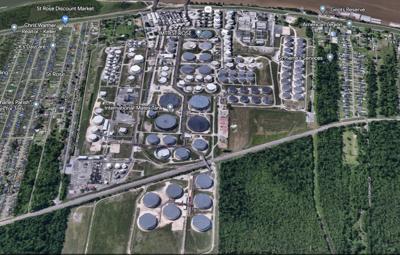An explosion and fire last year at a St. Rose petroleum, chemical and renewables tank farm on the Mississippi River started when contract workers were welding on top of a large crude tank and fumes from residual oil inside the tank ignited, federal and state regulators say.
Federal regulators faulted International-Matex Tank Terminal for allowing the workers to weld without first purging the 2,500-gallon container of residual crude and failing to follow other safety procedures, documents say.
As result, IMTT has already paid more than $39,000 in fines to federal environmental and workplace regulators and must spend at least $150,000 on equipment to cut dangerous emissions and foul odors. Odors from the 12-million-barrel plant have been a source of complaints to state regulators by nearby residents.
The out-of-service tank with residual crude oil remaining inside exploded and caught fire on the afternoon of April 3, 2023, at the 460-acre complex along River Road.
The incident hospitalized two workers, sent low-hanging smoke off site toward a wooded area and forced the precautionary closure of a nearby railroad line, St. Charles Parish officials said at the time.
The U.S. Environmental Protection Agency and Occupational Safety and Health Administration investigated the fire and IMTT's operations afterward, leading to violations and fines from both agencies, reports say.
Among the problems identified by the EPA, inspectors found IMTT's emergency response plan did not anticipate the kind of flammable vapor release and fire that happened and concluded the facility had safety equipment breakdowns that contributed to the workers' injuries.
"Respondent’s fire suppression system malfunctioned due to a value failure; and contractors were required to self-rescue due to the explosion and fire and were injured/hospitalized in the process," according to a settlement IMTT reached with the EPA.
Under that deal reached last month, IMTT officials said EPA had agreed to cut its initial fine of $94,000 by three-quarters to $23,569, along with the $150,000 in improvements to lower emissions.
"We’re happy to have reached a resolution with EPA. The initial fine amount of $94K is reflective of the fact that there were no economic benefits of noncompliance, the duration of the violation was minimal, and IMTT made good faith efforts to cooperate with EPA," Carlin Conner, IMTT chairman and CEO, said in a statement.
He said the new emissions equipment will come on top of $1.6 million the company has spent on odor-control systems that go beyond regulatory requirements. The operation has also spent $460 million in recent years on equipment as part of a shift of its bulk storage operations toward chemical, renewable and other non-petroleum products.
Conner said the company has taken a number of steps in response the April 2023 fire, including "strengthening our hot work and contractor management policies," increasing training for emergency response, permit writing and contractor management, and adding a dedicated safety manager to the St. Rose operation.
The company has also hired a new vice president of operational excellence to work toward avoiding future incidents.
In the agreement IMTT reached with the EPA last month, the company settled two civil violations of its general duties both to identify potential hazards in handling dangerous chemicals and also to minimize the consequences of those dangers.
The EPA violations followed an inspection of the tank farm in July 2023, three months after the fire.
During that on-site review, EPA inspectors found IMTT failed to conduct appropriate testing of equipment to detect deficiencies that could lead to hazards and also failed to maintain safe work practices in addition to the breakdown in fire risk planning and the fire suppression system.
The safe practices included steps to protect workers when they open or work on equipment holding hazardous materials and to identify and control flammable materials inside tanks.
According to the settlement, the EPA inspectors found the contractors did not follow the tank farm's "hot work" policies, which are common safety procedures designed for work on equipment with dangerous or flammable materials inside.
In a similar vein, OSHA separately faulted IMTT for allowing workers to weld in the presence of a "mixture of flammable gases, vapors, liquids, or dusts with air" from the tank. OSHA inspectors said the storage tank "had not been properly cleaned or purged" beforehand of oil or other flammable materials.
OSHA issued a serious violation for the breakdowns and a $15,625 fine in August. The fine has since been paid, company officials said.
Under the EPA settlement, IMTT did not admit to EPA's allegations but has paid the fine and gave up the right to contest the agency's claims.
IMTT officials said that the EPA told them the company did have policies and procedures that could have prevented the fire. In a March 1 report to state regulators, IMTT repeated this conclusion, saying the incident was preventable and could have been avoided had its procedures been followed.
The new technology called for in the EPA settlement involves up to 15 specialized access hatches on IMTT's fixed-roof tanks. The hatches will replace lower-technology pressure vents that can be susceptible to greater emissions than necessary. With emergency pressure-relief equipment, the hatches are designed to reduce tank emissions by 4%.
The vents and their emissions are designed to reduce dangerous pressures that can build up from flammable and volatile chemicals inside the tanks, the EPA says. IMTT has up to a year to install the lower-emission hatches, the EPA says.

